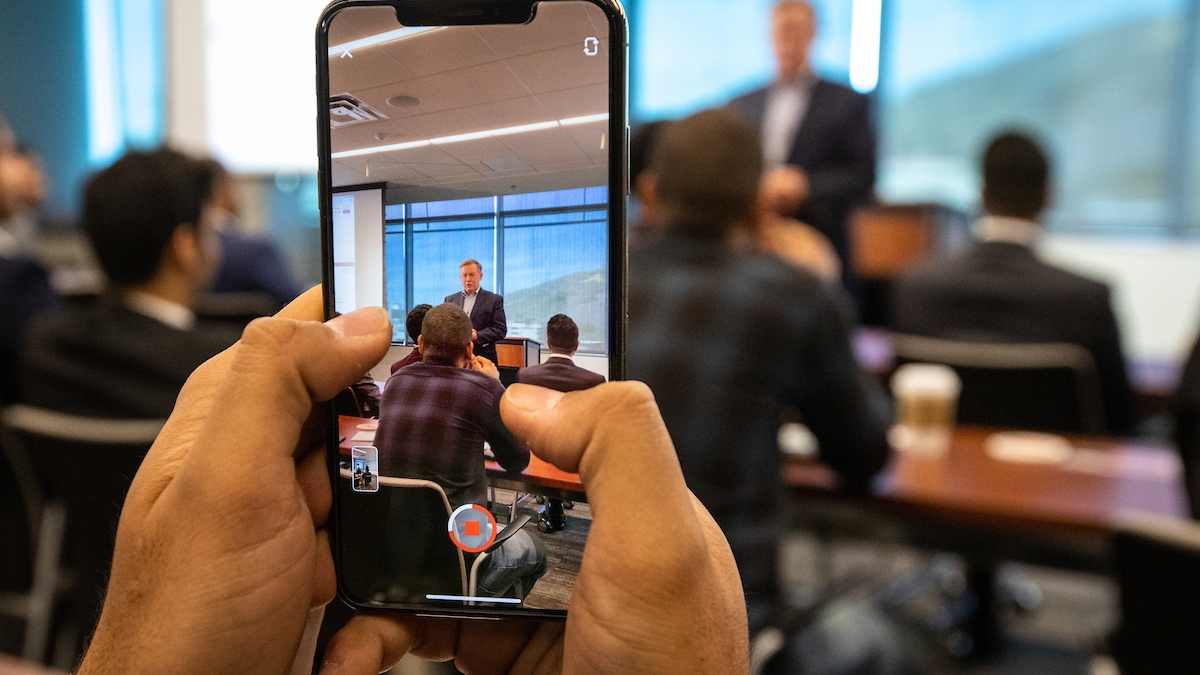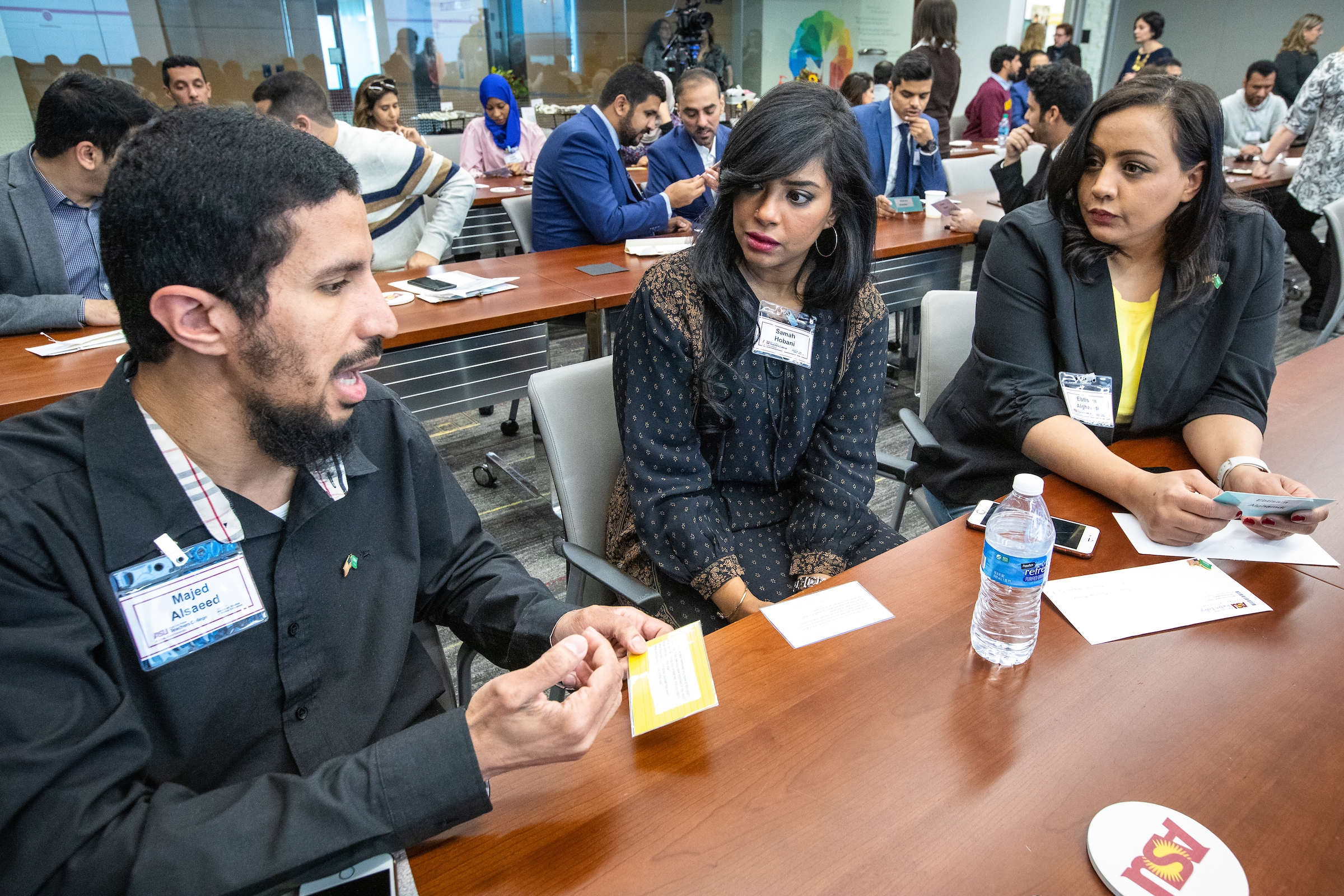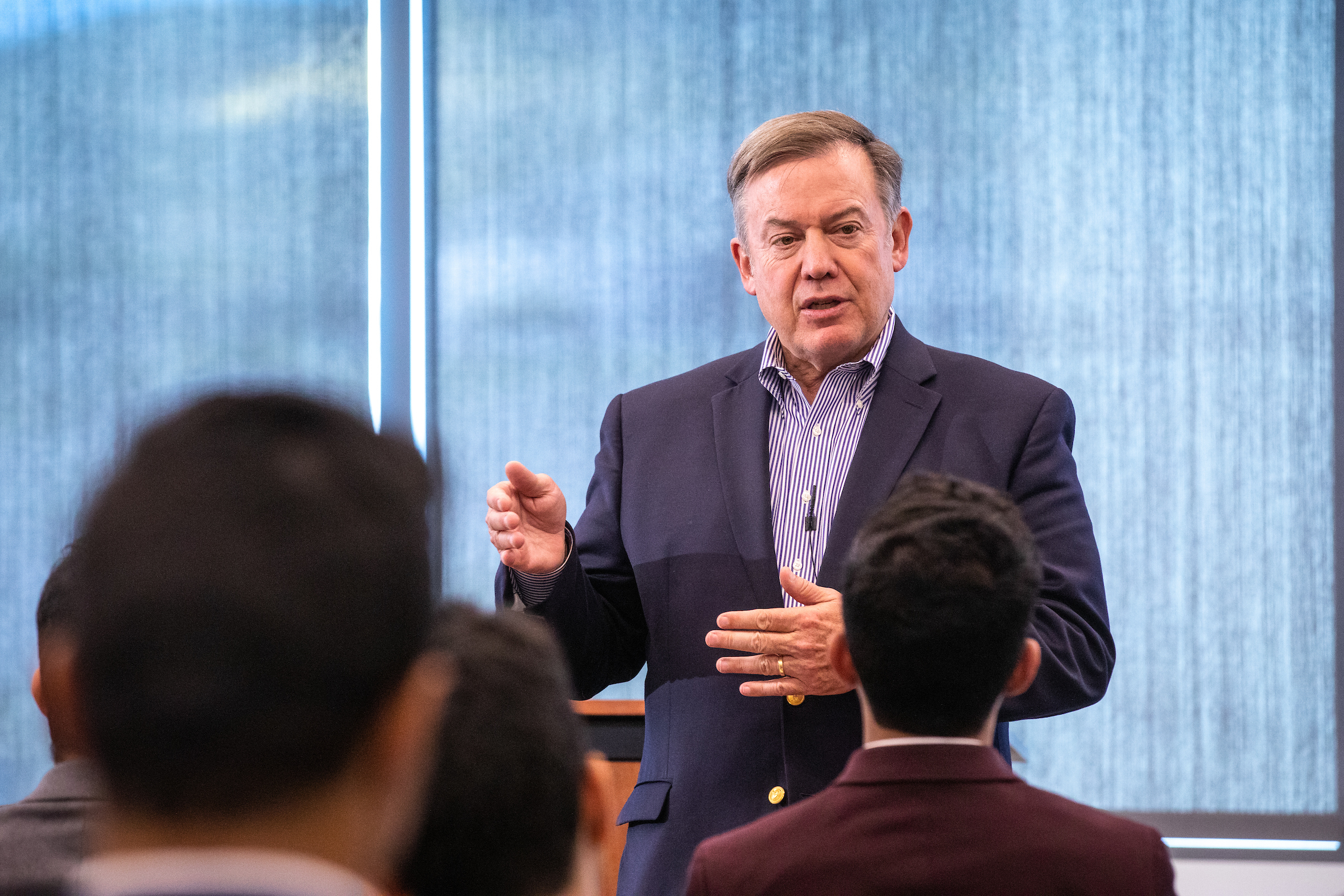Arizona State University President Michael Crow on Tuesday addressed 46 scholars from Saudi Arabia who spent a year at ASU as part of a teacher leadership program and will be returning to their native country next week.
Crow essentially told the cohort thank you, job well done and good luck on your next journey. Oh, and remember — learning is a lifelong pursuit.
“Teaching is a profession that will only accelerate ahead in the decades to come in terms of importance,” Crow said. “Workers of the future, citizens of the future and others in the future will constantly be involved in more learning in a cycle we call lifelong learning, universal learning and continuous learning.
“So that means as teachers, if you’re not constantly learning and improving, if you’re not in that mindset for the rest of your life, you’re not going to be a very good teacher.”
The Saudi group was here as part of the “Building Leadership for Change through School Immersion” program, an initiative of the Ministry of Education of the Kingdom of Saudi Arabia that was created in direct response to their government’s goal of investing in the future of their country by changing the educational landscape in their local schools.
The program launched on Feb. 19, 2018, through ASU's Center for Advanced Studies in Global Education in the Mary Lou Fulton Teachers College. Its aim was to strengthen the values, skills, knowledge and attitudes of teachers, counselors and principals through university-led structured immersion in high-performing, English-speaking K-12 school systems.
(From left) Saudi educator cohort members Majed Alsaeed, Samah Hobani and Ebtisam Alghamdi talk at the Fulton Center in Tempe on Tuesday about a memorable experience during their yearlong program. Photo by Charlie Leight/ASU Now
As part of the program, participants also attended various workshops; facilitated quality problem-based lessons; led others in developing problem-based learning opportunities; developed teacher leadership skills by exploring topics like communication, collaboration and adult learning; participated in a STEM camp; attended the Teacher Leadership Institute conference in Tucson; and participated in a mentorship program with Mary Lou Fulton Teachers College professors.
Following the coursework, all participants were embedded in top Phoenix-area schools within the Washington Elementary, Phoenix Elementary and Cave Creek Unified school districts. Through this experience, they learned firsthand how the American educational system works and developed individual professional learning plans that will support their role in leading change in Saudi Arabia.
Crow affirmed that change is coming, and that the role of the educator will be important in shaping Saudi Arabia’s future for generations to come.
“The high school graduate of 2020 and the years ahead will constantly be evolving,” Crow said. “It used to be that high school students didn’t know anything about the world. Now they must. They didn’t need to understand anything about other faiths. Now they must. As teachers, you must be open to change. Your job is not the rigid keeper of the rules. Your job is the creation of a learning environment where students can thrive.”
Abdulelah Alotaibi, an English-language supervisor in Saudi Arabia, said the country has become less conservative and more open to the world. However, their education system is still lacking.
“The accountability of the student is far greater here,” Alotaibi said. “The expectations and standards are also higher here than in Saudi Arabia. We have yet to meet the standard of rigorous curriculum or content in my home country.”
President Michael Crow stressed the importance of universal learning to the Saudi scholars, who will take what they've learned back to their home country next week. Photo by Charlie Leight/ASU Now
The standards are also lower for teachers, said Saeed Alzahrani, who has taught the English language in Saudi Arabia for 14 years.
“In Saudi Arabia we have a curriculum we must follow and present it to the students,” he said. “The teachers here have more choice to present topics to the students. There’s just not the same freedom.”
Teacher supervisor Samah Hobani said the program has showed her a way to help educators in her country become more successful and that she is excited to present to them those opportunities.
“Part of my job as a supervisor is to focus on a teacher’s professional development,” Hobani said. “I want to give them more hours of training to help refresh their teaching and give them more control of the curriculum.”
It wasn’t just all about teaching and learning. There were strong bonds and connections forged in the past year, said Jeanne Hardy-Miller, one of five mentors in the program who worked specifically with 10 male scholars.
“I have traveled the world extensively, but I had never met any Saudis before and all I had to offer was my personality, my smile and my empathy,” Hardy-Miller said. “I’m really going to miss them. I’m going to miss seeing their faces. I’m going to miss their smiles. I’m going to hear missing their ideas and their plans. We just feel connected. A year ago, we didn’t know each other at all.”
Top photo: One of the members of the Saudi cohort takes a quick video of ASU President Michael Crow speaking during a program at the Fulton Center on the Tempe campus on Tuesday, near the end of their yearlong program. Photo by Charlie Leight/ASU Now
More Arts, humanities and education

Award-winning playwright shares her scriptwriting process with ASU students
Actions speak louder than words. That’s why award-winning playwright Y York is workshopping her latest play, "Becoming Awesome," with actors at Arizona State University this week. “I want…

Exceeding great expectations in downtown Mesa
Anyone visiting downtown Mesa over the past couple of years has a lot to rave about: The bevy of restaurants, unique local shops, entertainment venues and inviting spaces that beg for attention from…

Upcoming exhibition brings experimental art and more to the West Valley campus
Ask Tra Bouscaren how he got into art and his answer is simple.“Art saved my life when I was 19,” he says. “I was in a dark place and art showed me the way out.”Bouscaren is an …




